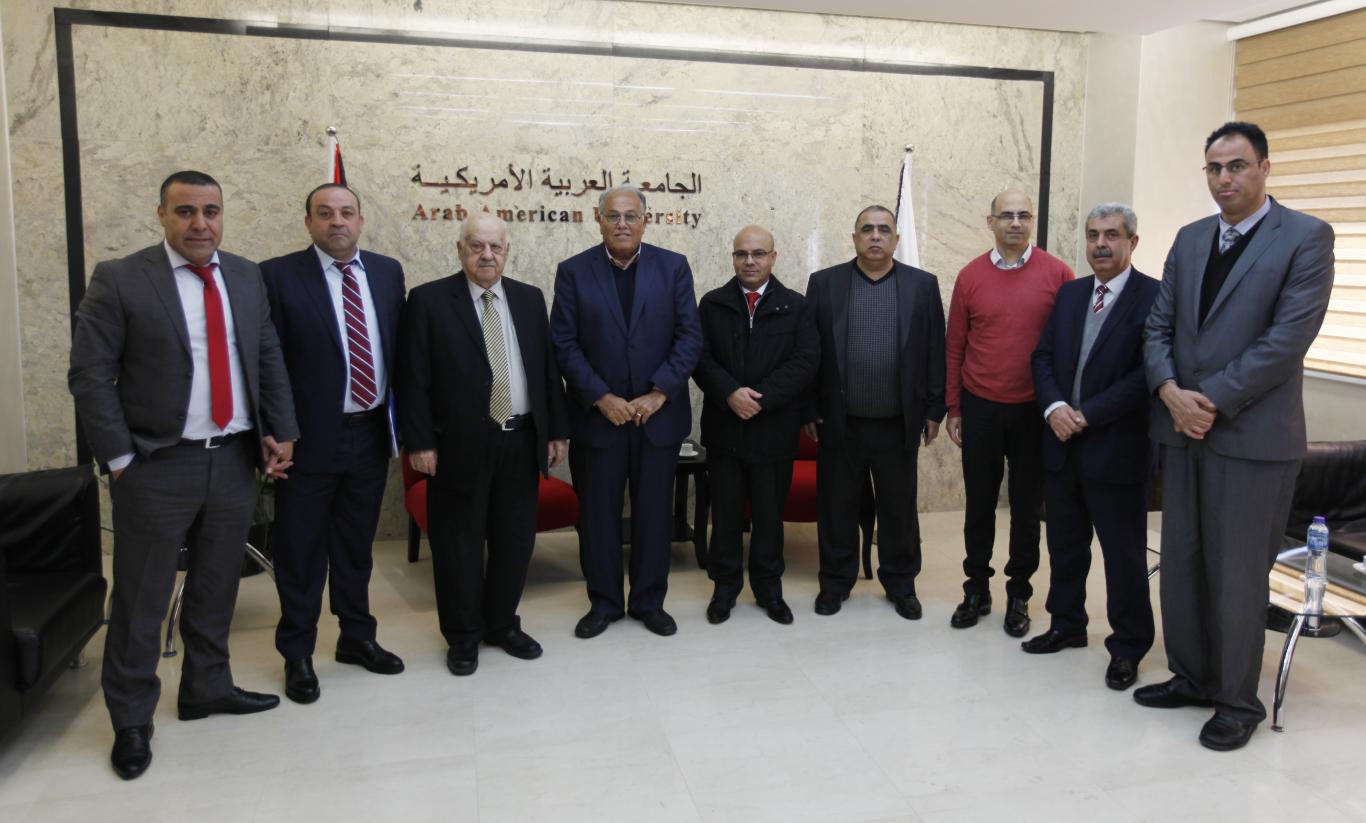Arab American University hosted the Head of the Anti-Corruption Commission Rafiq Al-Natsheh and Commission Assistant Attorney General Akram Al-Khatib in a lecture to the Faculty of Law students on the commission’s role and legal procedures in investigating corruption crimes as part of the partnership between the Commission and University to teach courses on fighting corruption.
University President Prof. Dr. Ali Abu Zuhri welcoming the Anti-Corruption Commission Chairman Rafiq Al-Natsheh
The University President Prof. Dr. Ali Zeidan Abu Zuhri, VPs for Planning and Development Dr. Osama Salama, Administrative and Financial Affairs Mr. Faleh Abu Arra, Training and Community Services Dr. Nizam Diab, Assistant for IT Affairs Mr. Bahjat Al-Aiaseh, Mr. Ghaleb Al-Hafi, Dean of the Faculty of Law Dr. Bashar Daraghmeh, Head of Public Law Department Hikmat Amarna, and Public Relations Manager Mr. Fathi E’mor, all welcome the Head of the Anti-Corruption Commission.
During the reception, Prof. Dr. Abu Zuhri welcomed Mr. Al-Natsheh and Mr. Al-Khatib and praised the Commission role in educating Palestinian university students about the importance of eliminating and avoiding corruption to build promising future leaders in all fairness and transparency in the state of law and justice. He also presented a brief on the university, its scientific openness to international universities and academic and research partnerships that serves the Palestinian educational process in general and Arab American students in particular.
He pointed, the university is keen to educate students in various extracurricular fields to create educated and loyal generation to the people and Palestine through holding seminars, workshops and conferences on daily and continuous basis through partnership with several official and civil institutions.
Mr. Rafiq Al-Natsheh praised the university administrators’ role, who described its steady work to develop academically and its great role to gather Palestine students from the occupied territories with students of the Palestinian governorates, promoting Palestinian concepts, adherence to the national identity, raise awareness and belonging in the student’s souls.
A lecture followed the reception for the Faculty of Law students, where a number of faculty members attended. It was about the Anti-Corruption Commission work and legal procedures in investigating corruption crimes.
Dean of the Faculty of Law Dr. Bashar Daraghmeh started the lecture welcoming Mr. Rafiq Al-Natsheh and Mr. Akram Al-Khatib. He stressed on the lecture importance in informing the students of the commission work, dealing with corruption cases, and its role in raising students’ awareness in a joint program with the Arab American University. Noting, the university is teaching a course related directly to fighting corruption.
During it, Mr. Rafiq Al-Natsheh talked about the Anti-Corruption Commission’s vision of establishing a corruption-free society based on integrity, transparency, justice and accountability. Stressing, corruption and occupation are two sides of one coin. He said their mission is to combine national efforts to fight corruption and eliminate its various manifestations in Palestinian society by revealing and addressing corruption causes, preventing and limiting its spread, activating community culture and cooperating with local, regional and international bodies to eliminate corrupters, prosecute and bring them to justice.
He pointed, there are strategic objectives of the Anti-Corruption Commission based on four main focuses, the first is to prevent corruption through legislative and institutional environment that prevents corruption and reduces its chances to happen. The second is implementing the law and prosecution through effective legislation. As for the third, he pointed it’s based on raising awareness, education, training and community participation with the community support and participation in the efforts to fight corruption and enhance integrity, transparency, accounting and questioning values. The final one is international cooperation through establishing bilateral and multilateral relations and relations with international organizations to strengthen anti-corruption efforts.
Mr. Akram Al-Khatib addressed legal procedures in corruption crimes investigations when receiving complaints or reporting a specific case of corruption. Then verification process begins. In case there’s evidence of corruption, the accused is brought and subjected to preliminary investigation by the commission. After that the case is referred to the Public Prosecutor's Office within the Commission then off to the Court of Corruption to adjudicate it and question the corrupt.
He stressed, there is no immunity for anyone and if there are suspicions about any person, whatever his position and influence is will be questioned, everyone is subject to law and there’s no bargaining in the Commission work. Anyone who’s found guilty will be charged by law and if the accused isn’t in Palestine a subpoena is issued to bring him. The Interpol shall bring him through international coordination with the state he’s located in, it happened before and a number of fugitives were handed over.
During the lecture, several questions and inquiries where asked by the students about several cases, the number of cases dealt with, whither the public has the right to know the corrupted people through publication in media and restore the stolen money in case it’s in foreign accounts.

